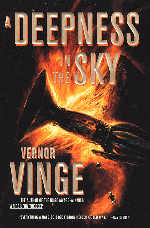| Vernor
Vinge Vernor Vinge was born in 1944 in Wisconsin. He is a mathematician at San Diego State University, specializing in distributed computing and computer architecture. His first publication "Apartness" appeared in New Worlds SF (June 1965). His novel, A Fire Upon the Deep, won the 1993 Hugo Award for Best Novel. |
| A Deepness
In the Sky
Vernor Vinge
This a deceptively straight-forward story. There are good people like Ezr Vinh, who is forced to come of age after tragedy strikes, and Qiwi Lisolet, who is manipulated and abused. The villains include Tomas Nau, the dangerous, charismatic leader of the Emergents, the sadistic Ritser Brugh, and Anne Reynolt, who is the very definition of a controlled personality. Alien beings include Sherkaner Underhill, a renaissance genius, and his precocious family. Readers of Vinge's previous novel, A Fire Upon the Deep, will recognize one of the characters, a member of the Qeng Ho. The story, then, is one of competing interests among the humans, balanced by a look at an alien civilization whose history offers parallels to our own. The deceptively straight-forward part shows up first in the language of the novel. The prose is unembellished and direct. Instead of using literary tricks or supposedly meaningful incomprehensibilities to convey a sense of the alien, the alien's culture is presented to us in terms we are familiar with. They have armies and nations, automobiles and airplanes, scientists and engineers. But they are different, and there are reasons the humans name their planet Arachna and refer to the inhabitants as spiders. At every major plot twist, something seemingly simple and known is revealed to be either misunderstood, or hiding a more complex situation. The characters, human and alien, use the same technique in their dealings with each other. Early in the novel, the Qeng Ho's and Emergent's assumptions about each other lead to tragedy with both sides forced into an uneasy alliance, waiting in orbit for the spiders to develop the technology the humans now need. The characters cover up their real intentions with simple stories that play to their opponents' expectations. Revelations about the lives and intentions of the characters accompany the action at every turn in the story. The result is a layering of simple events and explanations that together create a deep, complex story, and a terrific, compelling novel. While ostensibly set in the same universe as A Fire Upon the Deep, A Deepness in the Sky is so far removed in space and time that there is no need to have read the previous work in order to appreciate the new one. Vernor Vinge may not be the most prolific novelist in science fiction, but The Peace War, Marooned in Realtime, A Fire Upon the Deep, and now A Deepness in the Sky argue that he is among the best. The van Gogh quote at the head of this review is a measure of the level of artistry Vinge aspires to in A Deepness in the Sky. And a story with ideas and characters that grow in depth with every new chapter all the way to an ending that simply wraps up the story while incidentally explaining the use of ordinary human terms to describe the spider's lives is a measure of his success. Read it and enjoy. |
 Several
thousand years from now, expeditions from two human cultures meet
near an astronomical oddity known as the OnOff star. The Qeng Ho are
interested in trade, the Emergement in more direct forms of
exploitation. Neither group is there just for a chance to study a
unique star system, although that is an attraction. Transmissions
indicate there is a native civilization on the verge of achieving a
high level of technology, a potentially profitable situation. Thus
the stage is set for A Deepness in the Sky, the latest novel
by Vernor Vinge.
Several
thousand years from now, expeditions from two human cultures meet
near an astronomical oddity known as the OnOff star. The Qeng Ho are
interested in trade, the Emergement in more direct forms of
exploitation. Neither group is there just for a chance to study a
unique star system, although that is an attraction. Transmissions
indicate there is a native civilization on the verge of achieving a
high level of technology, a potentially profitable situation. Thus
the stage is set for A Deepness in the Sky, the latest novel
by Vernor Vinge.